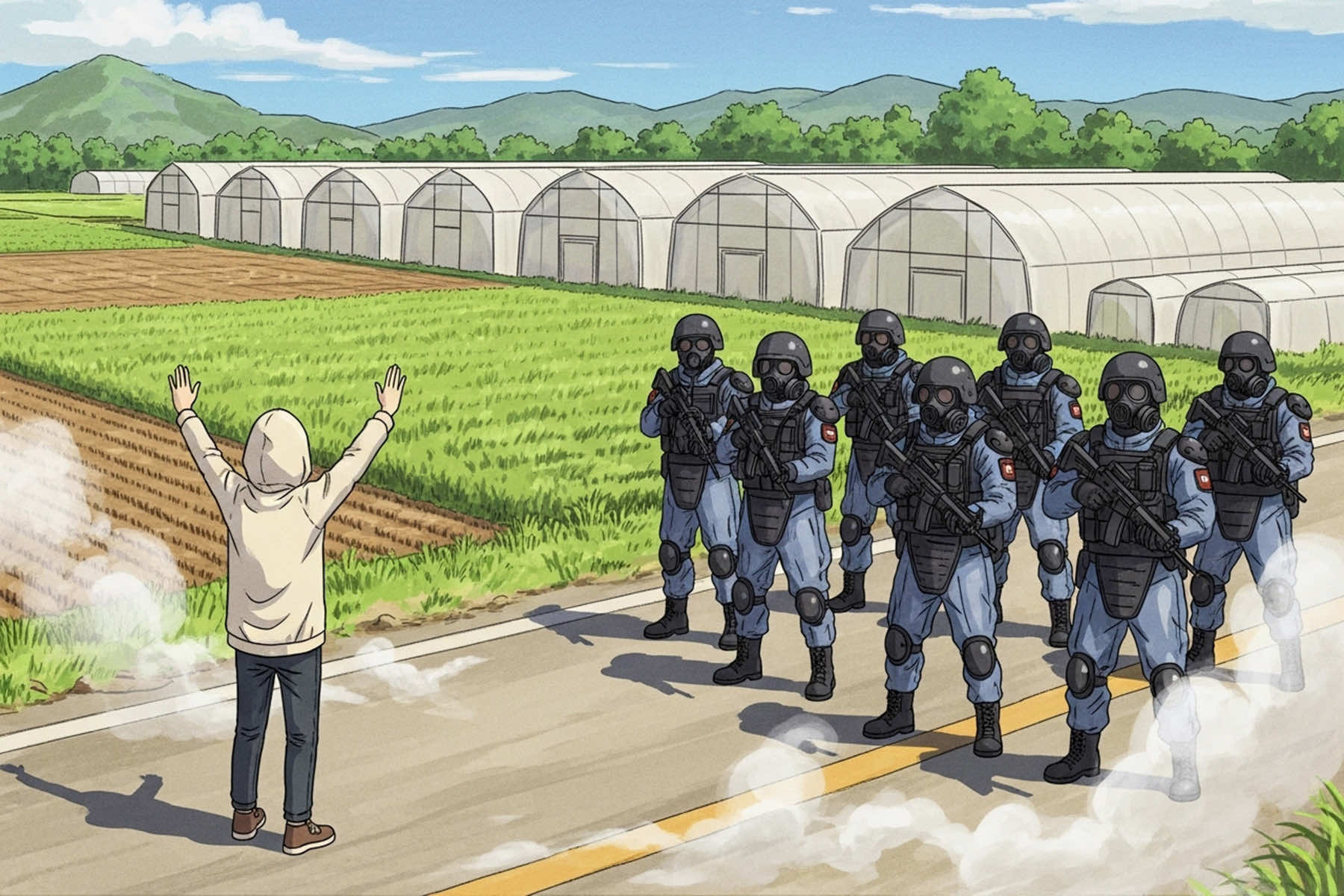
This explainer series, Catholic Doctrine on Immigration, explores how the teaching of faith and Scriptures intersect with immigration policy, focusing on the role of Milwaukee’s Catholic Church in responding to enforcement, labor dynamics, and family separation. Through detailed reporting across legal, economic, and pastoral contexts by Milwaukee Independent staff members, the series examines how Church teaching shapes institutional action and informs the Church’s engagement on national immigration issues. mkeind.com/catholicimmigration
When federal agents executed a sweeping raid on California’s largest licensed marijuana cultivation operation in July, it marked a chilling escalation in the evolving tactics of immigration enforcement under the Trump regime.
While the official justification for the action focused on alleged regulatory inconsistencies, the outcome extended far beyond cannabis policy. The raid served as a direct strike against immigrant labor, casting a long shadow across farming communities — and setting off alarm among organizers as far away as Milwaukee.
The Glass House facility, a sprawling agricultural complex in Santa Barbara County, had been operating with full state licensure under California law. Despite this, the Department of Homeland Security and the Drug Enforcement Administration coordinated a raid that led to the detention of dozens of workers, most of them immigrants.
Though the agencies declined to publish details, advocates on the ground confirmed that many of the employees swept up were living in the U.S. without legal status, part of a workforce that has long filled the labor gaps in California’s multibillion-dollar cannabis economy.
But to immigration observers, this was not a misstep or a policy overreach. It was a calculated show of force. For an administration seeking to reassert federal control over sanctuary states, the raid symbolized something larger than enforcement of cannabis regulations.
It sent a message: no workplace, even one legalized by the state, is beyond the reach of federal agents if immigrant labor is involved.
The tactical choice of a cannabis operation was also strategic. Unlike traditional farms, legal cannabis growers are heavily documented, making them a soft target for regulatory violations and worker compliance checks. This made Glass House unusually vulnerable to federal scrutiny, even though its scale and transparency were intended to insulate it from such outcomes.
In effect, the more legally compliant the farm was with state laws, the more exposed it became to federal intervention.
While the workers were not charged with drug offenses, many were placed into immigration proceedings. Others were released under surveillance conditions. The result was to weaponize the enforcement process as a disruption mechanism. The action was not meant to curb criminal behavior, but to destabilize employment conditions for immigrant workers and punish industries that provide them jobs.
For immigrant families in Wisconsin’s agricultural corridor, where dairy farms and meat processors depend on similar labor structures, the raid was not viewed in isolation.
Milwaukee-based immigration attorneys and labor organizers quickly drew parallels to local cases where ICE audits of factories or field operations mirrored the pretextual nature of the California action. In both cases, employers face regulatory probes, while the real damage falls on the undocumented workers whose lives and livelihoods are shattered by enforcement priorities.
The precedent set by the Glass House raid is especially dangerous because it circumvents the usual political and legal guardrails that govern immigration enforcement. By framing immigrant labor crackdowns as regulatory actions unrelated to ICE, the federal government gains access to new venues for targeting undocumented workers without public oversight.
It shifts the optics from humanitarian concern to administrative compliance, diffusing outrage while deepening the net of surveillance and detention. This blurring of enforcement categories also fractures trust between immigrant communities and industries once seen as safe zones.
In states like Wisconsin, where immigrant workers sustain everything from dairy production to restaurant kitchens, the implications are severe. If a fully legal employer in California cannot shield its workers from immigration enforcement, there is little reason to believe smaller businesses in Milwaukee or Madison will fare better under federal scrutiny.
The message is that legality offers no immunity. Immigrant labor, even in lawful settings, remains a target.
Glass House was not accused of trafficking, violence, or organized crime. Instead, the justification rested on licensing irregularities, paperwork gaps, and suspicions of worker misclassification. These are common across many agricultural sectors, especially in states where federal and local laws remain at odds. Yet in this case, the penalties fell disproportionately on the workers themselves — the very individuals whose labor keeps food and consumer goods flowing through American supply chains.
In Milwaukee, immigration advocates say the Glass House raid aligns with a broader pattern of selective enforcement designed to fracture organizing efforts. By targeting workplaces known for hiring large numbers of immigrants, federal agencies not only instill fear in labor forces but also disrupt any momentum toward collective bargaining, legal claims, or workplace safety complaints. The chilling effect is deliberate and effective.
The timing of the raid also raised concerns. It came amid growing pressure from Trump-aligned operatives to show visible enforcement victories ahead of key policy rollouts. With public attention shifting from asylum seekers to domestic immigration controls, the raid allowed the regime to project force without the optics of border militarization.
Instead, it advanced the same goals to remove undocumented workers, punish employers who rely on them, and reassert federal control over progressive states. This latest episode underscores how immigration policy under Trump has become less about securing borders and more about dismantling the infrastructure that supports immigrant lives.
Whether through farm raids, factory audits, or visa reclassifications, the objective is not just deportation — it is disruption. For thousands of workers and their families, the cost is paid in fear, instability, and the erosion of whatever fragile protections remain.
As Milwaukee and other cities brace for renewed ICE activity, the federal raid on Glass House stands as a warning. State compliance means little in the face of a regime willing to repurpose every agency, law, and loophole to advance a singular goal: the removal of immigrants by any means necessary.














